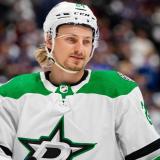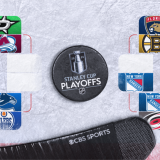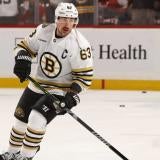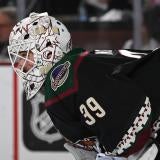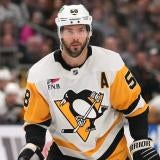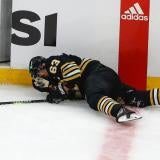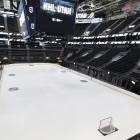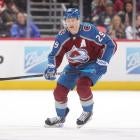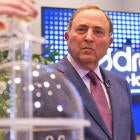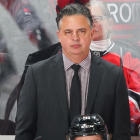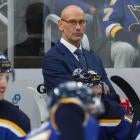The Anaheim Ducks have won the Pacific Division in each of the last three seasons. Their regular-season success is no longer in question. This is a team that has become an annual lock for the playoffs, but after three consecutive postseasons ending in Game 7 situations on home ice, impatience is setting in.
The good news for the Ducks is that in each of those three playoff appearances, they advanced a round further than the year before. If they hold the pattern, they’ll at least make it to the Stanley Cup Final... before losing in the seventh game on home ice. That's progress, at least, right?
They say that three’s a trend, but in the Stanley Cup Playoffs, the randomness of the game seems to hit some sort of hyper-drive. Bad luck is as good an excuse for what has happened to the Ducks, even if head coach Bruce Boudreau has become an easy target when. The unfortunate coincidence of having each of the last three years end in heartbreaking playoff defeats at Honda Center can’t be sitting well with the team. So how do they fix it?
It looked like Boudreau was even on thin ice coming out of that deep, but ultimately disappointing run. He may still be. One of his assistant coaches, Paul MacLean, is a recent Jack Adams winner. The Ducks’ AHL coach is Dallas Eakins, who was a rising star in the coaching world before helming the Edmonton Oilers to a fate they’ve become used to. Both could be safety nets available to GM Bob Murray if he wants to jettison Boudreau, but this is a head coach whose teams have gone 162-79-29 (a points percentage of .654) in the regular season since Boudreau took over.
Murray also went out and made some changes to the lineup. After declining to re-sign Francois Beauchemin, the leader of Anaheim’s blue line for the last five seasons, the Ducks got aggressive on the trade market.
The team acquired defenseman Kevin Bieksa from the Vancouver Canucks to add a two-way element with some grit to the back end, though Bieksa appears to be in his declining years. Perhaps more significantly, the team upped the speed and experience quotients by nabbing Carl Hagelin from the New York Rangers in exchange for former first-rounder Emerson Etem. Murray then filled in the blanks on the roster with cheaper free agents like Shawn Horcoff, Mike Santorelli and Chris Stewart on cap-friendly one-year deals.
Murray has also left himself a huge cushion underneath the salary cap if the Ducks need to add pieces ahead of the trade deadline to bolster the team ahead of what should be a deep playoff run. He'll certainly have options.
There’s still some question as to whether Frederik Andersen can be the goalie to lead the team to that title, but he showed some signs of brilliance last postseason. Additionally, the Ducks have a top-six forward group that would rival a lot of teams across the NHL with Corey Perry and Ryan Getzlaf at the top. They’re going to score and they’re going to be tougher to play against, but will they be better than they were a season ago?
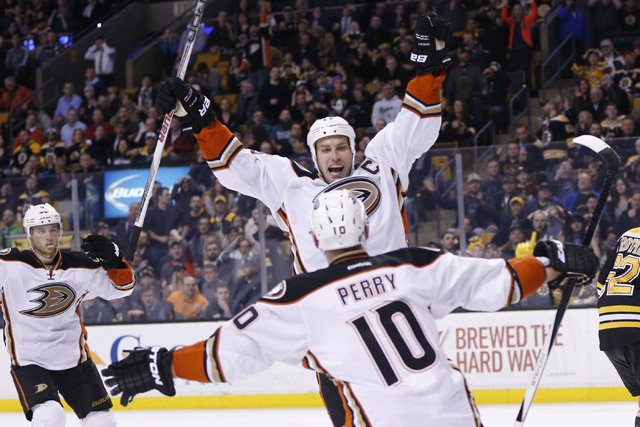
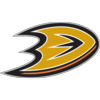 2015-16 at a Glance
2015-16 at a Glance
New Additions: D Kevin Bieksa, LW Carl Hagelin, RW Chris Stewart, C Shawn Horcoff, C Mike Santorelli, G Anton Khudobin
Key losses: D Francois Beauchemin, LW Emerson Etem, RW Kyle Palmieri
Top Returning Scorers: Ryan Getzlaf (77 GP, 25-45—70), Corey Perry (67 GP, 33-22—55), Ryan Kesler (81 GP, 20-27—47)
Total salary against cap*: $63,964,164
Remaining cap space*: $7,435,836
Biggest question heading into the season: How long is Bruce Boudreau’s leash?
There appeared to be some internal consternation after the Ducks got bounced from the playoffs by eventual Stanley Cup champion Chicago Blackhawks, but Boudreau was brought back. The question now is how much patience does Murray have and what, if anything, would trigger a change behind the bench? It would appear the Ducks are built for another run at first place in the Pacific Division, but if they stumble during the regular season, it looks like the Ducks have options if they want to replace the head coach in-season.
Season outlook
The Ducks have collected 105 regular-season wins over the last two years, have taken a step forward in each of the last three postseasons and added and boast one of the best top-six forward groups in the league.
Most teams would kill for a one-two punch like Perry and Getzlaf, but throw in a No. 2 center of Ryan Kesler's caliber and there's few easy matchups for Ducks' opponents. Hagelin should be a strong addition regardless of where in the lineup he plays, while the continued maturation of forwards like Jakob Silfverberg, Rickard Rackell and Jiri Sekac could make the Ducks even better rounded out up front.
The team is going to miss Francois Beauchemin on the back end, but this blue line will belong to Cam Fowler and Hampus Lindholm now, with the latter looking like he’s on his way to becoming a bona fide No. 1 NHL defenseman (who will need a new contract after this season). Bieksa won't be an adequate Beauchemin replacement, but he can be effective in managed minutes and provide a similar veteran presence on the back end.
The way things have gone for the Ducks over the last two seasons, they should be expecting a deep run and deserve to be viewed as a legitimate Stanley Cup threat. They’ve got a good shot at winning the Pacific Division for a fourth straight year, but will get pressure from the revamped Los Angeles Kings and should expect the San Jose Sharks and Calgary Flames to push for spots in the top three of the Pacific.
The playoff questions will be there all season long, no matter how much success the Ducks have. They'll face a very, very tough Western Conference field once they get there, but this is a team that has a chance to rise above the rest following three consecutive years of progression.
* - Salary cap figures via GeneralFanager.com as of Aug. 9.







